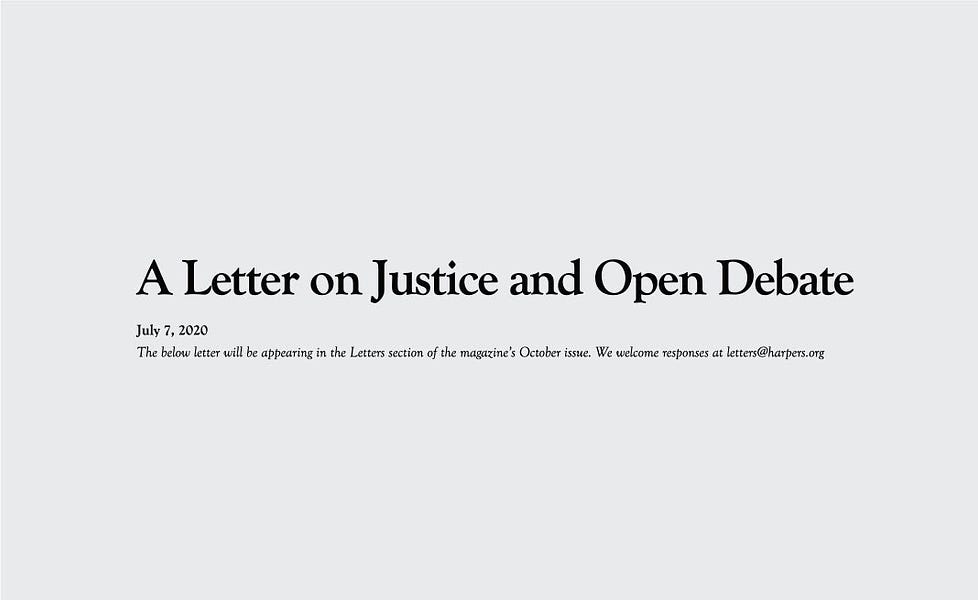This. The authors do a much better job of what i was attempting to do with my posts yesterday- mainly that the original Harper's piece was a bit tone deaf in that it's largely entitled authorship was complaining about being silenced by members of historically un-entitled, low-power, marginalized groups.
I have done some introspection on this topic and my initial views on what should be done regarding people like Rowling who espouse what I consider to be ignorant, incorrect, or just plain mean views. My initial thoughts yesterday were that the response should be to just ignore her and stop paying for her products- basically addressing the issue from the standpoint of the fiduciary relationship. While that approach seems to make some sense, the more i though about, the more I realized how it is a biased view coming somewhat from my position as a white, upper-middle class, male. It assumes purchasing power, ignoring the decades/centuries of marginalizing of the affected populations so that has resulted in them not having the means to make any direct negative financial impact. Basically, because of prevailing majority behaviors, the very group Rowling targeted and that would be the most negatively impacted by her views, is- as a result- much less likely to be able to directly target her by not purchasing her product. They can only impact the fiduciary relationship by calling for others to take action. It's easy for me to say "don't buy her books/movies/lego toys/etc." coming from a place where I could actually do so. In summary, the groups most negatively impacted by the views and most positively impacted by changes in these views is less likely to have the power/access to directly change them. Thus they scream loudly for those of us with the power to do so, while working to give the future power to do so themselves.
@Jon Snow The article you posted also captures my sentiments. I appreciate your thoughts,
@ClinicalABA. I think power is an important factor in all of this that should be considered. Social media lends itself to trending and viral reactions to public figures’ words, which doesn’t require a person to be famous to have an effect, and can be a means to empower marginalized voices. I see some of this shifting as a good thing because it is changing the culture in the direction of accountability and empowering marginalized groups. As we discuss cancel culture, I think it’s important to look at who is doing the talking garnering the responses/reactions, who is responding, and what are the consequences (to both the person initiating by posting publicly and the folks who react). Sometimes people calling out a public figure ALSO receive threats/bullying, not necessarily just the public figure.
I read more about the Pinker situation and the open letter written wasn’t calling for him to be fired, regardless of the quality or merits of the argument regarding his tweets. And Pinker wasn’t fired and did NOT lose his status as fellow of the LSA as was requested in the letter. And with JK Rowling, while she faced social media backlash, I’m not understanding how this is unfair or unwarranted. Her publisher has the right to decide the kind of authors they want associated with their products as it is also about their reputation as well as her opinions are shouted from the rooftops for all to hear, so to speak (I personally wonder why she has such an intense and directed interest in transgender identity, but that’s the psychologist in me and isn’t relevant here). Per what I understand, though, her publisher didn’t even drop her, they just published a statement that expressed disagreement with her.
I have yet to see evidence of widespread firing of people due to “cancel culture” that is unjust. If there are widespread trends of people who aren’t racist/sexist/etc.
mistakenly or falsely characterized as such and then fired, then we have a huge problem that should be addressed. But freedom of speech doesn’t mean freedom from criticism or consequences. Our society didn’t hold people in power or public positions as accountable for some of these words/behaviors in the past, and certainly our culture has shifted and evolved—which might be a wake up call to people who are openly racist, sexist, homophobic, transphobic, etc. and don’t want to face any real-world consequences for prejudice and/or discrimination.
And, if things do go too far in the direction of actually firing people en masse for assumptions or words that are misconstrued (or widespread violence committed against people who post things others don’t agree with), then in my opinion, things have gone too far, but I would imagine there would be a correcting shift back to a more moderate place if it got that extreme. That said, companies and institutions have a right to choose whom they want associated with their brand, so to speak, and this has not changed. Thinking about my own practice, if I hired an employee who said egregious things on social media, by default my business is now associated with this person and I could be seen as espousing those views by extension as a result if I remained silent. Would I fire the person? It would depend on what was said and why, but I think it could be an appropriate response depending on severity.
Online bullying and harassment, however, is an entirely different topic—not sure where laws fall on this but I’m guessing this is not protected as free speech? Is speech that encourages violence protected? I‘m not as familiar with these laws.





